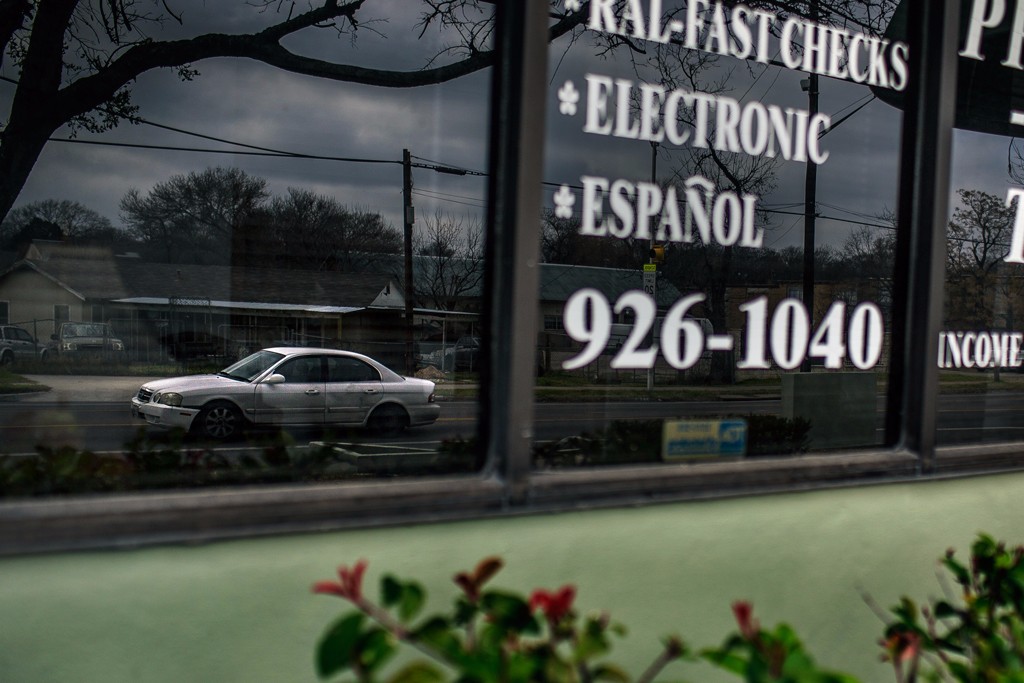Fake Attorneys Prey on Undocumented Immigrants
By Lucia Benavides
For Reporting Texas
Veronica Avila Zavala was desperate for help when her husband faced deportation proceedings.
So she turned to fellow East Austin churchgoer Marisela Jimenez Mandujano. Zavala said Mandujano claimed she worked for an immigration attorney who could free her husband.
Zavala opened a credit card account and collected money from family and friends to come up with the $14,000 that Mandujano demanded. Six months later, her husband was still detained, the money nowhere to be seen. And when Zavala tried to phone the law firm, no one even answered.
As it turned out, the law firm didn’t exist.
President Obama’s recent executive order gave five million undocumented immigrants a chance to remain in the country. But it also created opportunities for scammers, who claim they can help these immigrants avoid deportation. A Texas judge’s ruling has blocked Obama’s measure for now, but if a higher court lifts the injunction, the number of scams is expected to rise dramatically.
“People are desperate for good news and hope,” said Paul Parsons, a long-time immigration lawyer in Austin. “And they, unfortunately, are excited and willing to pay their hard-earned savings to people they should not trust.”
Undocumented workers have been preyed upon for years by fake attorneys who promise to help them stay in the country legally. They claim the process is easy and that they will take care of all the work — for a large sum of money.
“Sometimes, [victims] come in here saying they’ve already started an application,” said Megan Sheffield, attorney at the Equal Justice Center, which serves low-income communities. But when Equal Justice employees look for the application in the United States Center for Immigration Services database, she said, they cannot find it.
Some victims even receive a notice of deportation because nothing has been filed or because incorrectly filled out paperwork calls attention to the illegal status of undocumented immigrants.
Scammers use different techniques to deceive their victims. The most common scam is to take advantage of the difference between the Spanish word “notario” and the English phrase “notary public.” In Latin America, a notario is an attorney. In the United States, a notary legally witnesses and certifies documents.
These scammers advertise themselves as notarios who can help with immigration issues, attracting immigrants who don’t know the difference.
Immigration lawyer Kevin Lashus said immigrants sometimes get in trouble because they rely on people providing services illegally who are well-intentioned but unqualified.
“They fancy themselves legitimate business people,” Lashus said. “They’re not always out to steal. They just want to go around the attorneys.”
In Texas, only lawyers or non-lawyers accredited by the federal Bureau of Immigration Appeals can legally help with immigration applications. And that’s for a reason: If not trained, they can file the wrong form for clients, exposing their illegal status.
In 2013, the Texas Attorney General’s Office shut down an unauthorized immigration consultant firm called Cristo Vive For Immigrants that had provided unlawful services from an office in East Austin since 1987. But that’s rare, Parsons said.
“Once people start to catch up, they fold their tents and disappear” along with the money, he said.
Obama’s initiative targets a population that’s less-educated — and easier to deceive — than the immigrants who qualified for residency under the Deferred Action for Childhood Arrivals, Lashus said. Many who may qualify for Deferred Action for Parental Accountability moved to the U.S. at a later age and often don’t speak fluent English.
“These are 50- and 60-year-old parents who are really invested,” Lashus said. “They are not as sophisticated as their children, who were largely college kids, very much American.”
Victims can report scams to the Federal Trade Commission and file a complaint with the Unauthorized Practiced of Law (UPL) Committee of the State Bar of Texas or the Office of the Attorney General Consumer Protection Division.
The Texas Attorney General’s Office has received 311 complaints since 2011 and shut down 75 unauthorized immigration consultants since 2002.
The UPL Committee, which deals with many forms of fraudulent law, doesn’t identify cases by type of legal practice.
“I’d venture to say 20 to 30 per year,” said Lashus, who serves on the committee. “But that’s a guess.”
One consequence of immigration fraud that cannot be undone: deportation.
Parsons said lawyers have pleaded with the government not to deport scam victims.
“The government has been reluctant to agree to this because victims of immigration fraud are primarily undocumented, and they do not want to give them indefinite permission to remain in our country,” he said.
In late 2013, Zavala sued Mandujano in a Travis County small claims court. Justice of the Peace Raúl Arturo Gonzalez ruled in July that Mandujano should pay Zavala $6,900. So far, Mandujano has paid $900. A hand-written note by Mandujano in the court file says the rest will be paid off little by little.
“At this point, I’ve left it up to God,” said Zavala, who came to the United States from Mexico in 2000. “Last time I saw her, I said ‘Even though this is out of my hands, the only thing I hope is that this stays on your conscience.’ ”
Zavala’s husband is still in custody. For the past two years, she’s cared for their two young children alone, working as a taqueria cook. She also struggles with the uncertainty of her family’s future.
Mandujano could not be reached for comment.

